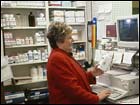|
To brand or not to brand
|
 |
November 15, 2001: 2:22 p.m. ET
Opposition from big drug makers may mean end of pure-play generic firms.
By Staff Writer Kim Khan
|
NEW YORK (CNN/Money) - Watson Pharmaceuticals blindsided its investors this week, missing earnings expectations and slashing guidance, but the company also painted a dismal picture for the generic drug industry as a whole in justifying its move towards branded drugs.
Watson, whose shares have now lost about 40 percent of their value since the beginning of the week, said on Tuesday it would be concentrating on higher-margin proprietary drugs and getting away from its generic operations.
"The generic industry has been under considerable pressure over the last several months due to increased competition and aggressive tactics by brand companies seeking to delay the introduction of generic products, and these new initiatives are designed to reduce our exposure to these trends," said Allen Chao, Watson chairman and CEO, in a statement.
Merck (MRK: down $0.25 to $64.64, Research, Estimates), the top U.S. pharmaceutical company in terms of sales, did not return calls for comment, while number two Pfizer (PFE: down $0.07 to $42.31, Research, Estimates) said it had no comment on Watson's statement.
Analysts said an increasingly competitive generic environment could mean pricing pressures that may spur companies to increase branded research, like Watson.
Watson spokesman Chris Katis told CNN/Money that in addition to legal battles, the generic business is getting more complex, with customers holding out until the end of the 180-day period of exclusivity generally granted to the first company to market a generic version of a drug, anticipating even greater savings.
Is the generic drug business moving towards a price war?
"It's the $64,000 question right now, and it may be the $64 billion one," said Steve Valiquette, drug analyst with UBS Warburg. "It's one of those things that's not easy to analyze because it's all behind the scenes." Valiquette said there could be price troubles generated by the manufacturers themselves or by the consolidation seen in the wholesaling sector.
"Right now there's more questions than answers," he said. "But we know several generic (companies) saw soft top-line growth in the third quarter."
Keeping the scales even
Ivax (IVX: down $0.19 to $17.54, Research, Estimates) is one company that has struck an almost perfectly equal balance, in revenue terms, between branded and generic drugs.
"What's been happening in recent days is that the brand companies have become quite adept with coming up with ways -- ways which we think are inappropriate -- to delay the time for generics to come into the market,"
Ivax Vice Chairman and President Neil Flanzraich told CNN/Money.
To deal with this, Flanzraich said, Ivax has come up with a two-part solution. The first part is to build its own proprietary business, and the company now has about 700 scientists and physicians working on its branded products.
"Ivax probably has the deepest pipeline of anybody as far as branded drugs are concerned," said UBS Warburg's Valiquette.
Flanzraich said the move is just common sense when you look at the numbers. "If you take all of the sales of generic companies combined, they won't equal the sales of (AstraZeneca's top-selling heartburn drug) Prilosec," he said.
The second part of Ivax's plan is to try to be a leader in developing very difficult generics, which prevents a large number of companies from selling brand-equivalent versions.
Flanzraich noted Bristol-Myers Squibb's (BMY: down $0.48 to $54.20, Research, Estimates) cancer drug Taxol. Ivax's efforts to gain U.S. Food and Drug Administration approval for marketing its generic version of Taxol has embroiled the company in a long legal battle.
Another company that has seen the benefits of a branded business is Barr Laboratories (BRL: up $0.66 to $64.72, Research, Estimates), which on Wednesday raised its second-quarter fiscal 2002 earnings guidance because of better-than-expected sales of its proprietary breast cancer treatment.
Barr took the mergers and acquisitions route to shore up its branded business, buying Duramed Pharmaceuticals in June to complement its female healthcare portfolio.
The company is also seeing strong continued sales of its generic version of Prozac.
Generic biz as tough as it ever was
In contrast to Barr and Ivax, generic company Mylan Laboratories (MYL: up $0.65 to $32.00, Research, Estimates) has decided to stay mostly in the brand-equivalent business, with about 83 percent of its sales coming from generics.
"The generic business is and always has been very sporadic," Pat Sunseri, Mylan vice president for communications and board member, told CNN/Money.
"There's nothing unusual about the generic business now," Sunseri said. "There's always some pricing pressure." She said Mylan believes the generic sector is strong right now, as evidenced by the company's strong second-quarter earnings performance.
Mylan reported second-quarter earnings per share of 50 cents, beating First Call's consensus number by 9 cents per share.
Valiquette said Mylan is simply sticking to what it do best.
"Mylan has probably had the worst track record of anybody in their attempt to build a branded business and for them it clearly has not worked out," he said. "Certain companies are just better off sticking to their niche." 
|
|
|
|
|
|

|

